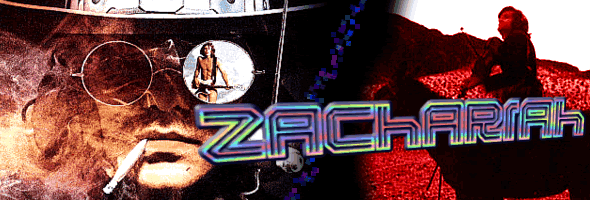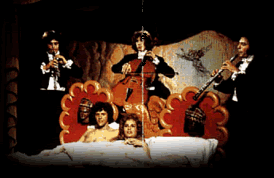
Color, 1971, 93 mins. Directed by George Englund
Starring Don Johnson, John Rubinstein, Barry Melton, Elvin Jones, Country Joe and the Fish, Pat Quinn, Dick Van Patten / Produced by George Englund and Lawrence Kubik / Music by Jimmy Haskell / Cinematography by Jorge Stahl
Format: DVD - Anchor Bay (MSRP $29.98)
Letterboxed (1.85:1) / Dolby Digital Mono
One of the more blissfully incoherent mainstream features of the 1970s, Zachariah comes off like the work of an acidhead trying to fuse together Ken Russell's Tommy, Conrad Rooks' Siddhartha, and Alejandro Jodorowsky's El Topo... only even stranger than it already sounds. Billed as "the first Electric western," the film has now been tagged on video as "the first and only Electric western." Whether that's a good thing will depend entirely on the viewer's individual taste.
Thanks to a mail order gun retrieved in the middle of the desert, young Zachariah (John Rubinstein) decides to go out into the fronteir with his best buddy, Matthew (Don Johnson). An accidental shooting in a saloon convinces Zachariah that he could become a big time gunslinger, so the boys hook up with The Crackers, a band of outlaws better at guitar strumming than straight shootin'. The boys' loyalty is tested when their egos and outside forces threaten to tear them apart, and Zachariah is initiated into manhood by the sultry Belle Star (Pat Quinn, not the one from Rocky Horror). Sure enough, they're headed right for a showdown with each other. Will they regain their heads in time before someone bites the dust?
The major attraction of Zachariah is the fantastic soundtrack, which pounds and pulsates through virtually every scene. All of the various band members contribute impressively to the film, most memorably during the amusing Belle Star seduction. As a linear narrative, it isn't as clever or Unavailable since its brief VHS release from Magnetic Video in the very early '80s, Zachariah has been given an unlikely restoration from Anchor Bay on DVD. The letterboxing adds considerably the sides of the image and looks almost pristine (though non-anamorphic for some reason), apart from a couple of fleeting blemishes in the last two reels. The color isn't as powerful as the Magnetic version ("electric blue" indeed), but the visuals are smoother and easier on the eyes, with an almost mind-boggling clarity of detail. While this film screams out for a stereo soundtrack, it has always existed in mono and is presented as such on the DVD. However, the music sounds sharp and free of distortion, which should please fans just fine. No extras apart from chapter selections.
 interesting as one might expect given the screenplay writte by the Firesign Theater (who subsequently disowned the film). On the other hand, camp movie fans will howl at the ridiculous gay subtext, which extends far beyond the young boys' pre-Village People outfits. In fact, Zachariah might make a good double feature with Nicholas Ray's outlandish lesbian western, Johnny Guitar or Paul Morrissey's Lonsesome Cowboys. Don Johnson, a gay icon at the time before his resurgence on Miami Vice, offers one of his better performances, though the emotional range of the finale is obviously beyond his reach. Along with A Boy and His Dog and The Harrad Experiment, this proves there used to be more to him than pastel suits and swaggering charm. Rubinstein, who had yet to break through with Pippin, gives an equally laid back performance and seems to be well within the spirit of the movie.
interesting as one might expect given the screenplay writte by the Firesign Theater (who subsequently disowned the film). On the other hand, camp movie fans will howl at the ridiculous gay subtext, which extends far beyond the young boys' pre-Village People outfits. In fact, Zachariah might make a good double feature with Nicholas Ray's outlandish lesbian western, Johnny Guitar or Paul Morrissey's Lonsesome Cowboys. Don Johnson, a gay icon at the time before his resurgence on Miami Vice, offers one of his better performances, though the emotional range of the finale is obviously beyond his reach. Along with A Boy and His Dog and The Harrad Experiment, this proves there used to be more to him than pastel suits and swaggering charm. Rubinstein, who had yet to break through with Pippin, gives an equally laid back performance and seems to be well within the spirit of the movie.
